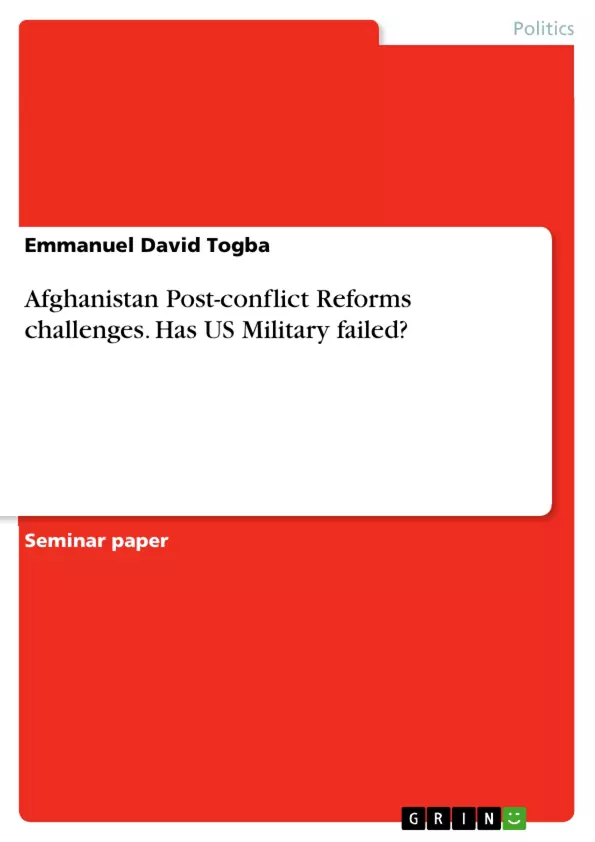Our discussion here is not about the circumstances that led to Afghan war, nor are we concerned about its tumultuous and chequered history ever since the days of Afghanistan’s last king Zahir Shah – the son of Nadir Shah. The modern historians and political experts believe it to be one of the golden eras of Afghanistan under King Zahir Shah. Most importantly, one should ask a question: is it that easy for war-waging military to build a nation which is believed to be hanging in to the middle-ages as for as human development, social, economic and political development was concerned (Hoffman, & Fodor, 2010). Therefore, it was always going to be a monumental task from the word goes. One that would require lots of resources at hand, such as human, material, of requirement of regional, international support and of strong political will from all the stakeholders. Let’s not downplay the fact that it is by no measure a small country, which finds itself in its tough neighborhood and vice versa. The country has been suffering from war for more than thirty years, ever since the invasion of USSR. However, it is vital to know as to what is post conflict reformation that military is supposed to undertake? It is nothing but the reformation of state and society as a whole (Foust, 2010). This is manifested through ensuring rule of law ameliorating, building up economic institutions and construction of physical infrastructure, and lastly making sure that human rights are respected. In the sense that state and society is completely sensitive of those values of freedom of expression, human dignity and human rights.
Inhaltsverzeichnis (Table of Contents)
- Introduction
- The background that led to the Afghan War
- U.S - Occupying or Liberating Power
- Strategy and the Road-ahead for reformation and reconstruction
- Difficulties of Construction
- US Military has accepted its Mistakes of the Past
- Regional Strategy
- A post-War Transition Lesson
- Post-War Germany and Military handover
- Short term Goals vs. Sustainability
- Issue of Governance Reform
Zielsetzung und Themenschwerpunkte (Objectives and Key Themes)
This work examines the challenges of post-conflict reformation in Afghanistan following the U.S. military intervention. It explores the difficulties faced by the military in transitioning from a wartime to a peacetime role, and the complexities of rebuilding a nation ravaged by war. It also analyzes the effectiveness of U.S. strategies in achieving its objectives and the implications for the future of Afghanistan.
- The challenges of post-conflict reconstruction in Afghanistan
- The role of the U.S. military in Afghanistan's reformation
- The effectiveness of U.S. strategies in achieving its objectives
- The complexities of building a nation in the aftermath of war
- The challenges of transitioning from a wartime to a peacetime role
Zusammenfassung der Kapitel (Chapter Summaries)
- Introduction: This chapter introduces the topic of post-conflict Afghanistan, highlighting the challenges of nation-building in the aftermath of war. It draws parallels to the experiences of countries recovering from World War II, emphasizing the complexity and magnitude of the task at hand.
- The background that led to the Afghan War: This chapter delves into the historical context of the Afghan War, examining the reasons behind the U.S. intervention. It discusses the alleged involvement of Afghanistan in providing sanctuary to terrorists and the rationale behind the U.S. decision to remove the Taliban regime from power.
- U.S - Occupying or Liberating Power: This chapter explores the perception of the U.S. military by the Afghan people, examining the evolving narrative surrounding the U.S. role in Afghanistan. It addresses the controversy surrounding the U.S. presence and the challenges of building trust in a war-torn nation.
- Strategy and the Road-ahead for reformation and reconstruction: This chapter focuses on the strategies adopted by the U.S. military for post-conflict reconstruction and reformation in Afghanistan. It highlights the importance of sensitivity to the post-war scenario and the complexities of transitioning from war to peace.
- Difficulties of Construction: This chapter examines the practical challenges encountered during the reconstruction process, highlighting the limitations and shortcomings faced by the U.S. military in addressing the needs of the Afghan people.
Schlüsselwörter (Keywords)
The key words and focus topics of this work include: Afghanistan, U.S. military intervention, post-conflict reconstruction, nation-building, war on terror, regional security, governance reform, Afghan National Army, Afghan National Security Force, strategy, effectiveness, challenges, difficulties, cultural sensitivity.
Frequently Asked Questions
What is the central focus of this paper on Afghanistan?
The work examines the challenges and difficulties of post-conflict reformation and nation-building following the U.S. military intervention.
How is the U.S. role in Afghanistan perceived?
The paper explores the evolving narrative of whether the U.S. was seen as an occupying or a liberating power by the Afghan people.
What are the main components of post-conflict reformation?
It involves ensuring the rule of law, building economic institutions, constructing physical infrastructure, and respecting human rights.
What practical difficulties did the U.S. military face?
Challenges included cultural sensitivities, transitioning from wartime to peacetime roles, and the lack of a long-term sustainable strategy.
Does the paper compare Afghanistan to other historical examples?
Yes, it draws parallels with post-war Germany to discuss military handover and long-term governance reform.
- Citar trabajo
- Emmanuel David Togba (Autor), 2016, Afghanistan Post-conflict Reforms challenges. Has US Military failed?, Múnich, GRIN Verlag, https://www.grin.com/document/423611



